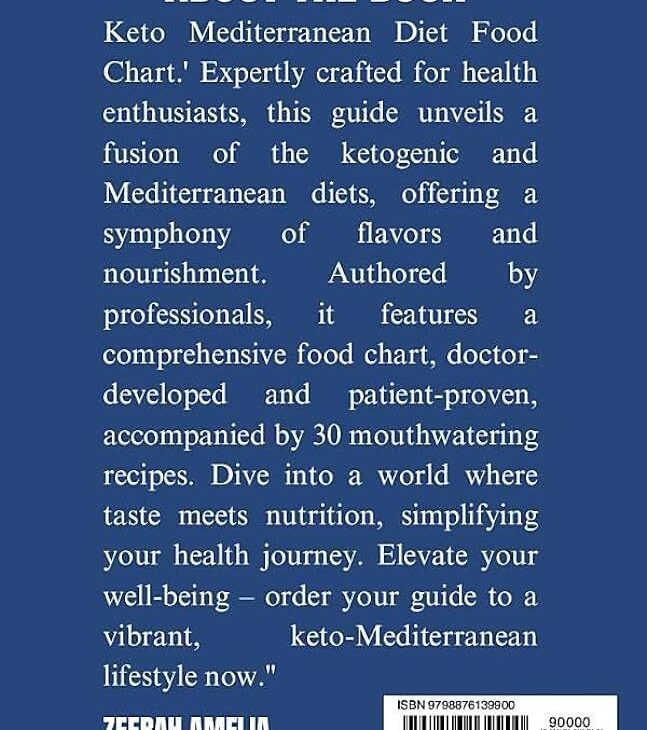Keto Vs Mediterranean Diet: The Keto diet is high in fat and low in carbs, while the Mediterranean diet is balanced with diverse foods and moderate in healthy fats. The Keto diet focuses on ketosis for weight loss, whereas the Mediterranean diet emphasizes heart health and longevity.
Choosing the right diet can be a pivotal step in your health journey. The ketogenic, or Keto, diet drastically reduces carbohydrate intake to shift the body’s metabolism into ketosis, a state where it burns fat for energy. This approach is known for its potential quick weight loss effects.
On the other hand, the Mediterranean diet, inspired by the eating habits of countries bordering the Mediterranean Sea, includes a variety of fruits, vegetables, whole grains, lean proteins, and healthy fats, particularly olive oil. This diet is recognized for promoting heart health and supporting a sustainable lifestyle. Both diets have garnered attention for their health benefits, but they cater to different lifestyle choices and nutritional philosophies.

Credit: www.reddit.com
Introduction To Keto vs Mediterranean Diets
Understanding the difference between the Keto and Mediterranean diets is crucial for choosing a healthy lifestyle. The Keto diet focuses on high fat, moderate protein, and low carbs. It aims at inducing ketosis, a state where the body burns fat for energy. On the other hand, the Mediterranean diet emphasizes fruits, vegetables, whole grains, and healthy fats. It includes moderate fish and poultry consumption.
Both diets have soared in popularity for their health benefits. The Keto diet is often linked to weight loss and blood sugar control. The Mediterranean diet is praised for improving heart health and longevity. Each has a unique approach to nutrition that suits different goals. People worldwide have adopted these diets, making them a staple in wellness communities.
Keto Diet Fundamentals
The Keto Diet relies on a very high-fat, low-carbohydrate intake. This plan drastically reduces sugar and starches. People eat foods rich in fats. Meats, cheeses, and oils are common.
Foods like pasta, bread, or sweets are not on this diet. The body enters a state called ketosis. This makes the body burn fat for energy, not carbs. Ketosis can lead to weight loss quickly.
Your body works differently in this state. Many say they feel less hungry. Blood sugar levels can get more stable. Some people see more energy. But not all bodies react the same way to ketosis.
Mediterranean Diet Principles
The Mediterranean Diet takes its roots from coastal cuisines such as those from Italy and Greece. It focuses mainly on plant-based foods like fruits, vegetables, grains, nuts, and seeds. The diet encourages consuming healthy fats, primarily from olive oil, and includes moderate amounts of fish and poultry. Red meat and sweets are to be enjoyed sparingly.
Key elements include the intake of whole grains, the use of herbs and spices for flavor, and a preference for low-saturated fats. Seafood should be eaten at least twice a week. Dairy comes from cheese and yogurt, and is eaten in moderate portions daily or weekly.
Nutritional Breakdown
The Keto diet focuses on high-fat, low-carb intake. Strictly, it’s about 70-80% fat, 20-25% protein, and only 5-10% carbohydrates. People eat meats, dairy, and greens, no sugar and starches.
Mediterranean diet is rich in diverse nutrients. It includes fruits, vegetables, whole grains, and lean proteins. Olive oil is a key fat source. It emphasizes a balance of all macronutrients.
Health Benefits Compared Keto Vs Mediterranean Diet
The Keto diet focuses on high-fat, low-carb foods that prompt the body to enter a state of ketosis. This process burns fat for energy, leading to significant weight loss. Studies have shown that individuals on a Keto diet might lose weight faster than those on a Mediterranean diet. But, it’s critical to note that Keto is not suitable for everyone and should be followed with guidance due to its restrictive nature.
The Mediterranean diet encourages heart-healthy fats, fruits, vegetables, nuts, and fish. This diet has been linked to longer life spans and a reduced risk of heart disease. The inclusion of various nutrients and a balance of food groups promote overall wellness rather than just weight loss. For many, the Mediterranean diet is considered more sustainable in the long term than the Keto diet.

Credit: med.stanford.edu
Potential Drawbacks And Challenges
Risks associated with a Ketogenic lifestyle often emerge from strict dietary restrictions. The keto diet heavily limits carbs. This can lead to nutrient deficiencies. Some people might experience digestive issues, such as constipation, due to low fiber intake.
Long-term adherence can be challenging. Social events may be tough. A high intake of fats, especially saturated fats, is a concern for heart health. Participants might feel short-term fatigue, known as the keto flu, while their body adapts.
Considerations when adopting a Mediterranean diet include assessing your lifestyle. This diet involves diverse foods and balanced nutrient intake. It’s important to enjoy olive oil, fruits, vegetables, and whole grains. Seafood is preferred over red meat. It’s seen as more sustainable and less restrictive compared to keto. Yet, it may require more cooking and fresh food access, potentially increasing cost and prep time.
Lifestyle And Sustainability
The Keto diet can be hard to stick with for a long time. It needs strict carb limits. People often miss eating fruits and grains. Many quit Keto because it’s too tough. A break from it can lead to weight gain fast.
On the other hand, the Mediterranean diet is about healthy eating habits. It includes olive oil, vegetables, and fish. It’s not just food, it’s about enjoying meals. This diet fits into life easier. People see it as a natural way of living, not just a diet.
Real-world Case Studies
Many people have shared their weight loss journeys with the ketogenic diet. Success stories often highlight significant weight reduction and improved health markers. These narratives usually involve a strict adherence to a high-fat, low-carb food regimen. One individual’s account mentioned shedding 30 pounds in just two months. Another person experienced enhanced energy levels and mental clarity.
Mediterranean diet enthusiasts often live in areas like Greece and Italy. Their diets are rich in vegetables, fruits, and lean proteins. Studies show these communities enjoy lower rates of heart disease and longer lifespans. They focus on healthy fats such as olive oil, nuts, and fish. This lifestyle demonstrates the power of a diet based on moderation and diversity.
Choosing The Right Diet For You
Keto Vs Mediterranean Diet: Choosing the right diet depends on your health goals. The Keto diet focuses on high-fat, low-carb foods. This can help in losing weight quickly. The Mediterranean diet includes varied foods and nutrients. This is known for heart health and longevity. Assessing individual health goals is key.
Speaking with doctors or dietitians is wise before starting. They understand nutritional needs and how different diets impact health. Each person’s body reacts differently to diet changes. Expert guidance ensures the chosen diet is safe and effective.
Frequently Asked Questions Of What Is The Difference Between Keto And Mediterranean Diet
Do You Lose Weight Faster On Keto Or Mediterranean Diet?
Weight loss can be faster on the keto diet due to its high fat, low carbohydrate approach leading to quicker ketosis and fat burn. The Mediterranean diet offers a more gradual weight loss through balanced eating. Individual results vary based on adherence and lifestyle.
Is Mediterranean Food Keto Friendly?
Yes, Mediterranean food can be keto-friendly when focusing on high-fat, low-carb options like olives, seafood, and leafy greens. Avoid high-carb foods like pasta and bread.
Is A Mediterranean Diet Good For Weight Loss?
Yes, a Mediterranean diet can support weight loss due to its focus on plant-based foods, lean proteins, and healthy fats. It emphasizes portion control and nutrient-dense meals.
What Are 3 Examples Of A Mediterranean Diet?
Three examples of a Mediterranean diet are Greek salad with olive oil dressing, grilled salmon with quinoa, and chickpea hummus with whole-grain pita.
Conclusion
Navigating dietary choices can often be perplexing, but clarity is key. The ketogenic and Mediterranean diets each offer unique benefits tailored to individual health goals and lifestyles. Whether prioritizing weight loss with keto’s low-carb routine or embracing the varied, heart-healthy foods of the Mediterranean plan, personal preferences and nutritional needs should guide your decision.
Remember, consulting a healthcare professional before starting any new diet is always a wise step. Discover which path aligns with your wellness journey and embark on a healthier you.Now , it is clear about the concept of Keto vs Mediterranean Diet.

– is a health enthusiast and blogger who is passionate about sharing his knowledge and experience in the vitamin and supplement industry. With over 5 years of experience in the field, William has developed a keen eye for identifying quality products and separating fact from fiction.
Last modified: May 15, 2024








